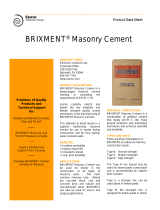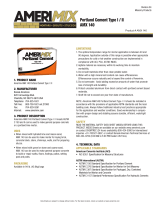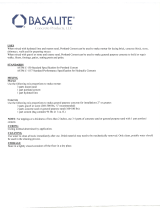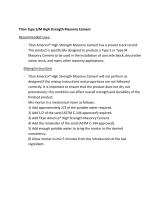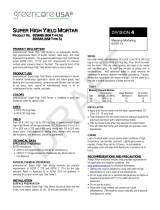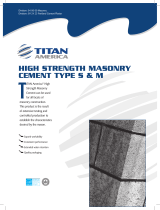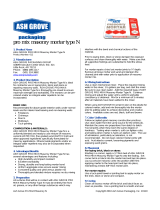Page is loading ...

Portland Cement, Lime & Sand Mortar
AMX 400 Type M, S, N
Product # AMX 400 M, S, N
1. PRODUCT NAME
Amerimix AMX 400 Portland Cement, Lime & Sand Mortar Type M
Amerimix AMX 400 Portland Cement, Lime & Sand Mortar Type S
Amerimix AMX 400 Portland Cement, Lime & Sand Mortar Type N
2. MANUFACTURER
Bonsal American
8201 Arrowridge Blvd.
Charlotte, NC 28273-5678 USA
Telephone: 704-525-1621
Toll Free: 800-738-1621 ext.27000
Fax: 704-529-5261
Internet: www.amerimix.com
3. PRODUCT DESCRIPTION
Amerimix AMX 400 Portland Cement, Lime and Sand Mortar
is a factory blend of portland cement, hydrated lime, and
dried sand with a formulation engineered to provide long
water retention, exceptional workability and superior bond
strength over masonry substrates.
FEATURES AND BENEFITS
• Factory blended under controlled conditions for
mix consistency
• High bond strength
• Extended mortar board life, less re-tempering required
• Increased yield compared to typical field mix mortars
• May be pigmented
USES
• Interior or exterior applications
• Above or below grade
• Laying or resetting brick, block and stone
• For all masonry veneer work
PACKAGING
Available in 80lb. (36kg) bags or bulk bags
APPROXIMATE COVERAGE
One 80 lb. bag yields approximately .78 cu. ft and will lay up to 12 concrete
blocks or 36 standard bricks with 3/8” mortar joints, or 17 sq. ft. of
manufactured stone. One 3,000 lb. bulk bag will lay up to 450 concrete blocks
or 1350 standard bricks.
LIMITATIONS
1. The type of mortar selected should be coordinated with the type of
application, type of masonry units and intended use. Mortars with lesser
compressive strength should be used with softer masonry units or tuck
pointing applications.
2. The optimal temperature range for mortar application is between 40 and
90 degrees. Application outside of this range is possible when appropriate
precautions for cold or hot weather construction are implemented in
compliance with ACI, PCA, ASTM, IMIAC or Masonry Institute standards.
3. Agitate material as necessary within its working time to maintain
workability.
4. Do not add materials other than clean potable water.
5. Water with a high mineral salt content can cause efflorescence.
Efflorescence occurs naturally and is beyond the control of Amerimix.
6. Do not overwater. Avoid adding excessive amounts of water that promote
segregation or bleeding of the mortar, and loss of strength and durability.
7. Protect uncoated aluminum from direct contact with portland cement
based materials.
8. Shelf life not to exceed one year from date of manufacture.
9. Not to be used as grout for traffic bearing surfaces.
10. Type N to be used for above grade applications.
NOTE: Amerimix AMX 400 Portland Cement, Lime and Sand Mortar should
be installed in accordance with the provisions of applicable ASTM standards
and the local building code. Always follow traditional industry best practices
appropriate for the application and weather conditions. Good workmanship in
conjunction with proper design and detailing assures durable, efficient, water-
tight construction.
SAFETY
READ THE MATERIAL SAFETY DATA SHEET (MSDS) BEFORE USING THIS
PRODUCT. MSDS Sheets are available on our website www.amerimix.com
or contact CHEMTREC (24 hours availability) 800-424-9300 for International
inquiries +01-703527-3887, or contact Bonsal American Technical Services at
800-334-0784 (8:00 AM to 5:00 PM Eastern US Time).
Data Sheets are subject to change without notice. For the latest revision, check our website at www.amerimix.com
Division 04
Masonry Products
LEED Credits 4 and 5

4. TECHNICAL DATA
Meets or exceeds the following:
ASTM C270 Property Specification Requirements
NOTES
• Mortar is designed to meet the requirements of ASTM C 270
Standard Specification for Mortar for Unit Masonry. This is a
laboratory test procedure.
• Mortar should be tested in the field by ASTM C 780 Standard Test
Method for Preconstruction and Construction Evaluation of Mortar
for Plain and Reinforced Unit Masonry.
• Due to the procedural differences between ASTM C 270 and C 780,
the compressive strength values resulting from field sampled
mortars are not required nor expected to meet the compressive
strength of the property specification requirements of C 270 as
tested under laboratory conditions, nor do they represent the
compressive strength of the mortar in the wall.
APPLICABLE STANDARDS
American Concrete Institute (ACI)
• ACI 530.1 Specification for Masonry Structures
ASTM International (ASTM)
• ASTM C 91 Standard Specification for Masonry Cement
• ASTM C 150 Standard Specification for Portland Cement
• ASTM C 207 Standard Specification for Hydrated Lime for
Masonry Purposes
• ASTM C 270 Standard Specification for Mortar for Unit Masonry
• ASTM C 387 Standard Specification for Packaged, Dry, Combined
Materials for Mortar and Concrete
• ASTM C 595 Standard Specification for Blended Hydraulic Cements
• ASTM C 780 Standard Test Method for Preconstruction and Con-
struction Evaluation of Mortars for Plain and Reinforced Unit Masonry
• ASTM C 979 Standard Specification for Pigments for Integrally
Colored Concrete
• ASTM C 1093 Standard Practice for Accreditation of Testing
Agencies for Unit Masonry
• ASTM C 1157 Standard Performance Specification For Hydraulic
Cements
• ASTM C 1314 Standard Test Method for Compressive Strength of
Masonry Prisms
• ASTM C 1384 Standard Specification for Admixtures for Masonry
• ASTM C 1586 Standard Guide for Quality Assurance of Mortar
International Masonry Industry All-Weather Council (IMIAC)
• Recommended Practices and Guide Specifications for Cold Weather
Masonry Construction
• Recommended Practices and Guide Specifications for Hot Weather
Masonry Construction
Data Sheets are subject to change without notice. For the latest revision, check our website at www.amerimix.com
National Concrete Masonry Association (NCMA)
• NCMA TEK Bulletin #8-2A Removal of Stains from Concrete
Masonry
• NCMA TEK Bulletin #8-3A Control and Removal of Efflorescence
SUSTAINABILITY
Amerimix products generally qualify for LEED Materials and Resources
credits for Recycled Materials and Regional Materials. Visit www.
amerimix.com or contact Technical Services for additional information
regarding LEED qualifications for your specific product application and
project location.
5. INSTALLATION
PREPARATION
• Remove all loose particles, dirt, dust, or any foreign materials that
would inhibit proper bond to brick, block, stone or masonry
substrate.
• Certain conditions may require the substrate to be SSD (saturated
surface dry) conditioned such as dry windy climates, porous
substrates, or high temperatures.
JOB MOCK UPS
Bonsal American requires that when Amerimix AMX 400 Portland
Cement, Lime and Sand Mortar is used in any application or as part of
any system that includes other manufacturers’ products, the contrac-
tor and/or design professional shall test all the system components
collectively for compatibility, performance and long-term intended use
in accordance with pertinent and accepted industry standards prior to
any construction. Written documentation of the test performed shall be
satisfactory to the design professional and contractor. Test results must
include the means and methods of application, products used, project-
specific conditions being addressed, and standardized tests performed
for each proposed system or variation. Approved mock ups or sample
panels should be retained until completion of the project.
MIXING
1. Use of a mechanical mixer will help ensure a better uniform mix.
2. Using clean potable water, approximately 1.5 gallons per 80 lb bag.
Pour approximately 3/4 of the required amount into the mixer. For
mixing from a silo, use the same approximate water ratio and follow
the same procedures.
3. With the mixer running, add bags of dry mortar or dispense from silo
and mix thoroughly.
4. A minimum of 5 minutes mixing time is recommended.
5. Add additional water in small amounts as necessary to achieve
optimum consistency and workability. Mix for a minimum of 5
minutes adding enough of the remaining water to achieve a fluid
workable consistency. Caution: Adding too much water will reduce
strength.
6. Let mix stand for 2 minutes to enable absorption of water and
re-mix.
7. Addition of cold water at high temperatures or warm water at low
temperatures will aid in adjusting the set time.
Mortar
Average Compressive
Strength Minimum
psi (MPa)
Water Retention
Minimum %
Air Content
Maximum %
Type M 28 Days 2500 (17.2) 75 12
Type S 28 Days 1800 (12.4) 75 12
Type N 28 Days 750 (5.2) 75 12

PERFORMANCE RECOMMENDATIONS
1. Only water lost to evaporation should be replaced by re-tempering, not
water lost to hydration. The re-tempering of mortar will alter color and
appearance of the mortar joint and may also reduce bond and
compressive strength.
2. Concave tooling of joints should be performed when mortar joint is
thumbprint hard. For consistency of finish and color, joints should be
struck with consistent timing, avoiding early or late tooling.
CURING
Under conditions of temperatures >80 degrees F (26.6 degrees C.), low
humidity and wind, loss of surface water occurs quickly. Fog spray as
needed, depending upon conditions. Protect from rain and freezing for 24
hours.
CLEANING
Use water to clean all tools immediately after use. Dried material must be
mechanically removed. For cleaning mortar joints, use the least aggress-
sive solvent required to accomplish the task. Only clean potable water
should be used in the cleaning process.
6. AVAILABILITY
Amerimix products are available throughout the U.S. and Canada.
For information please contact Amerimix at
Toll Free: 888-313-0755
Email: support@amerimix.com
Website: www.amerimix.com
7. TECHNICAL SUPPORT
For technical assistance please contact us
Toll Free: 800-334-0784
Fax: 704-945-0309
LIMITED WARRANTY
What Does This Warranty Cover? Bonsal American warrants that this product will (a) be free from defects in material and workmanship, and (b) conform to
specifications set forth in Bonsal American’s product literature at the time of manufacturer.
How Long Does Coverage Last? This warranty lasts for a period of one (1) year from the date of purchase. ANY IMPLIED WARRANTY OF MERCHANTABILITY OR
FITNESS FOR A PARTICULAR PURPOSE IS LIMITED TO THE DURATION OF THIS EXPRESS WARRANTY. Some states do not allow limitations on how long an implied
warranty lasts, so the above limitation may not apply to you.
What Will Bonsal American Do to Address Problems? Bonsal American will replace the defective product or refund the purchase price, at its option.
What Does This Warranty Not Cover? Bonsal American will not be liable for damage or loss resulting from a failure to store, use, install or maintain the product
in strict accordance with Bonsal American’s specifications and instructions. In no event will Bonsal American be liable for damages in excess of the purchase
price for the product. CONSEQUENTIAL, SPECIAL AND INCIDENTAL DAMAGES ARE NOT RECOVERABLE UNDER THIS WARRANTY. Some states do not allow the
exclusion or limitation of incidental or consequential damages, so the above limitation or exclusion may not apply to you.
How Do I Get Warranty Service? Within thirty (30) days after discovering a defect in the product, contact Bonsal American in writing at the following address:
Bonsal American
Technical Support Group
8201 Arrowridge Boulevard
Charlotte, NC 28273
Include with your letter a brief description of the problem and any sales receipt, invoice or other proof of the date of purchase. To obtain Bonsal American’s tech-
nical or sales literature, please call (800) 738-1621 or visit our web site at www.bonsalamerican.com.
How Does State Law Relate to This Warranty? This warranty gives you specific legal rights, and you may also have other rights which vary from state to state.
Data Sheets are subject to change without notice. For the latest revision, check our website at www.amerimix.com
8. WARRANTY

Amerimix is the registered trademark of Bonsal American, Inc., an Oldcastle Company
8201 Arrowridge Blvd. Charlotte, NC 28273 • www.amerimix.com • E-mail: amerimix@oldcastleapg.com • 800-334-0784
REV 02/12
Data Sheets are subject to change without notice. For the latest revision, check our website at www.amerimix.com
WARNING - INJURIOUS TO EYES. CAUSES SKIN IRRITATION.
This product contains portland cement and silica sand. Avoid contact with eyes and skin. Do not take internally. Crystalline silica sand may cause
serious lung problems. Avoid breathing dust and wear a respirator in dusty areas. Contact with wet unhardened concrete, mortar, cement or cement
mixtures can cause skin irritation, severe chemical burns or serious eye damage. Wear waterproof gloves, a fully buttoned long-sleeved shirt, full-
length trousers and tight fitting safety goggles. If you have to stand in wet product, wear waterproof boots high enough to keep product from getting
inside. If working on hands and knees, wear kneepads. Indirect contact through clothing can be as serious as direct contact. Promptly, rinse out wet
product from clothing.
KEEP OUT OF THE REACH OF CHILDREN AND ANIMALS.
This product contains a chemical known to the state of California to cause cancer. Consult Material Safety Data Sheet for further information.
FIRST AID: Eye Contact: Flood eyes with water for at least 15 minutes and consult a physician immediately. DO NOT RUB EYES. Skin Contact:
Wash exposed skin area with soap and water. Consult a physician if irritation persists. Inhalation: Remove to fresh air. Ingestion: Immediately consult
a physician.
For additional information, call Bonsal American at 704-525-1621 or CHEMTREC at 800-424-9300 or 703-527-3887 outside of the USA. Refer to
Material Safety Data Sheet (MSDS) for further information.
ENVIRONMENTAL ADVISORY: Uncured or crushed cured cement is an environmental hazard, which may adversely affect fish and wildlife.
Dispose of construction debris containing cement, including empty bags, at a permitted municipal disposal firm. Do not use crushed concrete as a
fill near an aquatic habitat.
/
